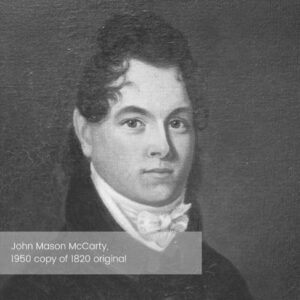Masque of Honor - Jack McCarty
Jack McCarty

John Mason “Jack” McCarty was born on March 14, 1795 at Cedar Grove, a large plantation on Virginia’s Northern Neck at the confluence of the Accotink Creek into the Pohick Bay. Jack was the second youngest of eleven children, ten of whom were sons, born to Colonel Daniel Ball McCarty II and Sarah Eilbeck Mason. Descended from Irish nobility, his paternal grandmother and George Washington were cousins, and his maternal grandfather was founding father, George Mason IV. Jack received his primary education from private tutors and later attended George Town Academy. He briefly attended the College of New Jersey at Princeton before the War of 1812 where he served in the 60th Regiment of the Virginia Militia under the command of Lt. Col. Nicholas Minor. Sometime after the war, he was promoted to the rank of Captain. In late 1814, he returned to the College of William and Mary with his brothers Howard and William, completing his undergraduate studies and earning his law degree.
Jack stood at six feet with dark wavy hair and piercing bright eyes. He was known for his ready wit, excellent memory, and was said to demonstrate an inexhaustible flow of spirits. In 1818, he was elected as a delegate to the Virginia legislature but resigned his seat before taking his oath of office as a result of violating Virginia’s Anti Dueling Act. After his duel with Armistead Mason, Jack fled to New York City, where he remained for the better part of a year before returning to his hometown. He married Lucinda Lee in December 1820, and the couple ultimately settled along the banks of the Potomac on the lands he inherited from his father. There, he built a fine home for their small family and established a horse farm, with hay being the only crop grown. In Leesburg, he built a large mill on the banks of the Tuscarora creek and opened a hotel in Washington City he named the American Hotel. He was a major investor in the C&O canal and in the construction of other canals in western territories. By 1830, Jack had been promoted to colonel in the Virginia militia and was a respected attorney, politician, and businessman in the region.
Jack’s business ventures paled in comparison to the investments he made in land speculation in the western territories. He travelled extensively to the Indian territories of the northwest, making investments in both Wisconsin and Michigan, and was responsible for investments in Milwaukee, Green Bay and Detroit, and the establishment of the towns of Menasha and Neenah in Wisconsin.
Jack became a leader in the Whig party and the head of Young Whig fraction. He served one term in the Virginia legislature from 1834-1835 and campaigned for the House of Representative in 1842, an election he lost. He remained active in politics until his death, which occurred while on a business trip to Detroit in 1852. He was initially buried in Leesburg but reinterred in Hollywood Cemetery in Richmond to be laid by Lucinda’s side at her death shortly thereafter.


